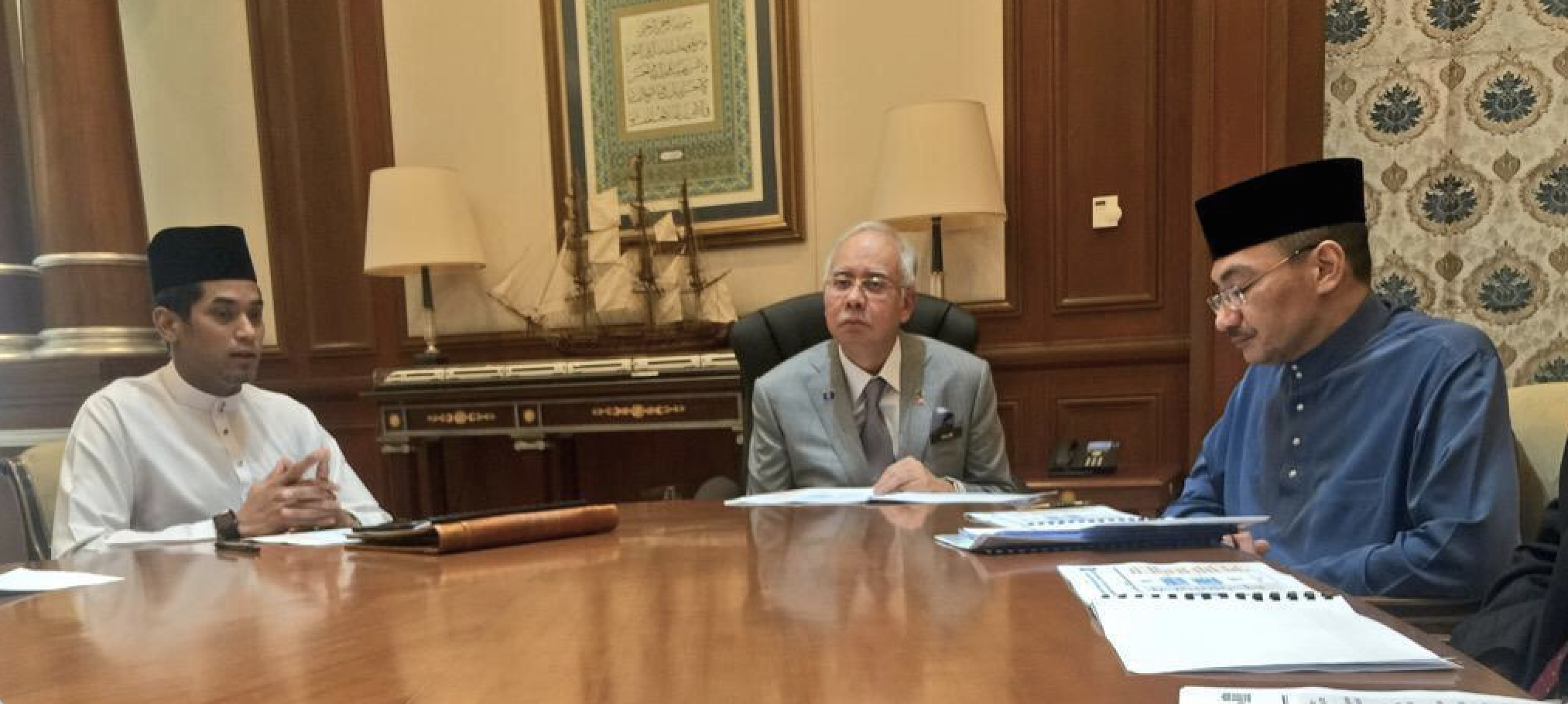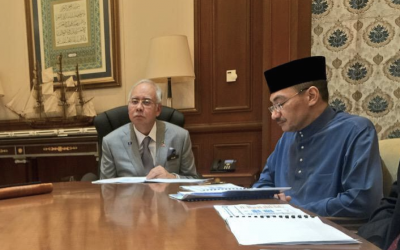
In a carefully worded statement last night the Prime Minister announced that he has “never taken money for personal gain”.
This was not an allegation that has specifically been made against him.
What Sarawak Report has reported is that investigators into the money missing from 1MDB have identified over US$700 million, which flowed into his private accounts from the government company SRC International Sdn Bhd and the Aabar owned Falcon Bank.
The Prime Minister specifically did not deny that he owned the bank accounts named nor the sums specified and dates of the transactions:
“The latest allegation is that I have taken state-linked funds for personal gain. I believe Tun, working hand in glove with foreign nationals, including the now discredited political attack blog Sarawak Report, is behind this latest lie.
Let me be very clear: I have never taken funds for personal gain as alleged by my political opponents” [Najib Razak Facebook Statement]
By making this denial in the way he did the Prime Minister has focused interest and attention on the dates and connections around the transfer of the main body of this money from Falcon Bank in 2013.
This sum totalling US$681,999,976 (RM2.6 billion) was transferred into his private account just days before the calling of the GE13 election in March 2013.
Election kitty?
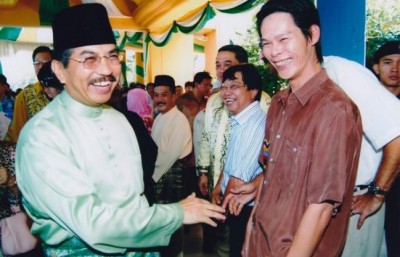
Najib’s reference to no “personal gain” bears a marked resemblance to the grounds on which his government exonerated the Sabah Chief Minister Musa Aman.
This was after Sarawak Report published a series of exposes about the tens of millions that arrived in Musa’s own bank accounts, which were proceeds of massive timber corruption in the state.
We produced so much definitive evidence of Musa’s layers of shell companies, which passed these timber kickbacks eventually to his own Zurich bank accounts (all still being examined by Swiss prosecutors) that it was impossible for the government to deny.
Instead, the Attorney General and his boss Najib dropped the case put together by prosecutors, on the basis that Musa had “assured” them that none of this money in his accounts was being used for “private” purposes, only to pay for his party’s election expenses.
This, opined the Attorney General and the ministers from Najib’s office back in 2012, made it all OK!
“The funds were contributions to the Sabah Umno liaison body and not for the personal use of the chief minister. No element of corruption was proven in this case”[Mohd Nazri Abdul Aziz]
Presumably, the ‘interim report’ due from the Auditor General (who also works under Najib) due next week on the 1MDB crisis was also planned to reach a similar conclusion, in order to close this inconvenient matter down?
Where the evidence points….
With the signals so strong that this is about election finance. it makes sense to analyse the dates and key indicators in this case.
After all, the investigators who have presented this evidence about Najib’s personal accounts were looking into malfeasance at the development fund 1MDB.
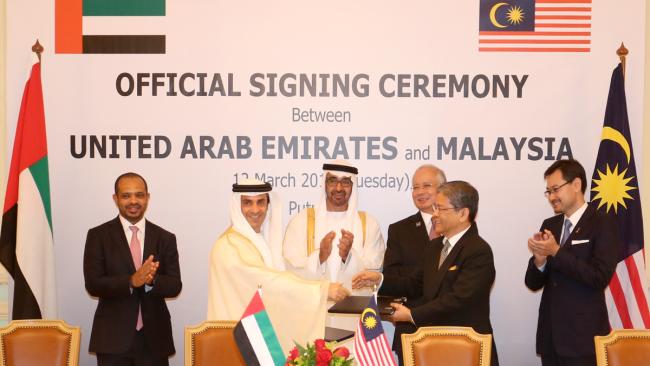
Indeed, the events and dates surrounding the initial enormous payments into Najib Razak’s personal account from the Aabar owned Falcon Bank are highly noteworthy.
Najib himself kicked off the sequence events, by hosting a much publicised ‘signing ceremony’ in KL of a so-called “Strategic Partnership” between Malaysia and Abu Dhabi on 12th March 2013.
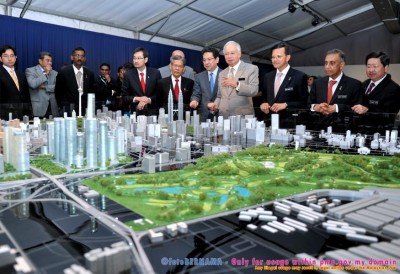
Gushing press releases from 1MDB explained that this represented the promise of mass investment of Arab money in Malaysian development, much in the same way that the PetroSaudi deal was advertised as an ‘injection of cash’ and massive ‘job creation’ for Malaysians, thanks to Arab money.
According to all this propaganda a key initial agreement under this ‘partnership’ was an alleged 50:50 ‘joint investment’ of RM18 billion by Malaysia’s state owned 1MDB and Abu Dhabi’s state owned Aabar fund in the development of the Tun Razak Exchange – a planned new business district named after the Prime Minister’s father:
HE Khadem Al Qubaisi said: “TRX is estimated to generate a gross development value of RM26 billion and attract 250 of the world’s leading companies, creating 40,000 new job opportunities for knowledge workers.
The multiplier effect generated will produce up to 500,000 new jobs, directly and indirectly throughout Malaysia, by the time it is fully completed.
The RM18 billion strategic partnership will separately invest, via a 50:50 joint venture between 1MDB and Aabar, in strategic high-impact long-term sustainable economic and social projects for the benefit of Malaysia and Abu Dhabi, to be identified by both parties under the advice of their respective governments.
The full statement:
RM18 billion strategic partnership – Malaysia and Abu Dhabi sealed RM18 billion strategic partnership to promote new economic initiatives in MalaysiaPUTRAJAYA, 12 March 2013: Malaysia and Abu Dhabi today sealed a RM18 billion strategic partnership to promote new economic initiatives that will spur billions of ringgit in long-term sustainable investments in Malaysia. The partnership will focus in investments in important high-impact projects vital to the long term-economic and social growth of Malaysia.
Separately, Abu Dhabi is moving ahead to provide the required capital for the multi-billion ringgit Tun Razak Exchange (TRX) development, making it the first major multinational anchor investor for Malaysia’s new growth nucleus with billions of major infrastructure works expected to be awarded starting as early as end March 2013. 1MDB will remain as the master developer of the TRX project.
TRX is a national initiative to spur growth in new areas and lead the way for Kuala Lumpur to be a global centre for international finance, trade and services.
The various partnerships are the outcome of continuing talks between Prime Minister Dato’ Sri Mohd Najib Tun Haji Abdul Razak and Abu Dhabi’s Crown Prince and Deputy Supreme Commander of the Armed Forces of the United Arab Emirates, His Highness General Sheikh Mohamed Bin Zayed Al Nahyan, promoting long-term sustainable economic growth beneficial to both countries.
The two separate strategic initiatives will be formed between companies under both 1Malaysia Development Berhad (“1MDB”) and Abu Dhabi’s Aabar Investments PJS (“Aabar”).
Aabar is the strategic investment company of Abu Dhabi and is controlled via Abu Dhabi state-owned International Petroleum Investment Company (IPIC). 1MDB is wholly owned by the Government of Malaysia.
Aabar Chairman and IPIC Managing Director, HE Khadem Al Qubaisi and 1MDB Chairman Tan Sri Dato’ Seri Lodin Wok Kamaruddin signed the two strategic agreements at the Prime Minister’s Office in Putrajaya.
Gracing the event were His Highness, The Crown Prince and Dato’ Sri Mohd Najib. Aabar CEO Mohamed Badawy Al-Husseiny and 1MDB CEO Datuk Shahrol Halmi signed as witnesses.
Tan Sri Dato’ Seri Lodin said: “These strategic partnerships firmly underscore global investor confidence in Malaysia as a long-term investment destination and economically sustainable growth centre enjoying peace, stability and good governance”
“Crucial to this is the commitment and leadership of Dato’ Sri Najib in shaping the economic transformation of the country towards a high-income economy,” Tan Sri Dato’ Seri Lodin added.
1MDB’s sole shareholder – Government of Malaysia – sees TRX as a key enabler for both the Economic Transformation Programme and the Government Transformation Programme.
HE Khadem Al Qubaisi said: “TRX represents an exciting opportunity for us to help realise a truly dynamic vision, where we can bring our expertise in sustainable infrastructure to anchor Asia’s next economic hub.
“More importantly, it underscores Abu Dhabi’s long-term commitment in the strategic economic development initiatives of Malaysia under Prime Minister Najib Razak’s continued leadership”
1MDB will both enter into smart partnerships and also provide opportunities for local developers and global players to drive new growth and make this national initiative a reality.
TRX is estimated to generate a gross development value of RM26 billion and attract 250 of the world’s leading companies, creating 40,000 new job opportunities for knowledge workers.
The multiplier effect generated will produce up to 500,000 new jobs, directly and indirectly throughout Malaysia, by the time it is fully completed.
The RM18 billion strategic partnership will separately invest, via a 50:50 joint venture between 1MDB and Aabar, in strategic high-impact long-term sustainable economic and social projects for the benefit of Malaysia and Abu Dhabi, to be identified by both parties under the advice of their respective governments.
Abu Dhabi also agreed to develop a RM21 billion strategic petroleum reserve facility in Johor, Malaysia with a capacity to store 60 million barrels of crude oil and petroleum storage facility for the exclusive use of Abu Dhabi.
In fact, no money has ever been raised from the Abu Dhabi side to invest in this development.
The only money that has been raised was US$3 billion in borrowings from 1MDB, which was backed by a letter of support from the Malaysian Ministry of Finance, run by Najib.
This letter of support was signed by Najib just two days after the signing ceremony on March 14th 2013, according to the 1MDB Global Investments prospectus, the company under which the bond was raised.
It was two and a half weeks later on April 3rd that Najib dissolved Parliament and called the General Election.
And on April 15th, during the campaign that an official announcement was made confirming that the US$3 billion bond had already been raised:
“KUALA LUMPUR, 15 April 2013: 1MDB (1Malaysia Development Berhad) has raised the required capital for its new strategic economic initiatives between Malaysia and Abu Dhabi.
This capital is an integral part of the Government-to-Government collaboration between Malaysia and Abu Dhabi on a strategic partnership sealed on 12 March 2013… Through the 50:50 joint venture company, Abu Dhabi Malaysia Investment Company (ADMIC), 1MDB and its partner Aabar Investments PJS will leverage on their global resources to drive these initiatives.”[1MDB press release]
Full Press release:
KUALA LUMPUR, 15 April 2013: 1MDB (1Malaysia Development Berhad) has raised the required capital for its new strategic economic initiatives between Malaysia and Abu Dhabi.
This capital is an integral part of the Government-to-Government collaboration between Malaysia and Abu Dhabi on a strategic partnership sealed on 12 March 2013 during the visit by Abu Dhabi’s Crown Prince and Deputy Supreme Commander of the Armed Forces of the United Arab Emirates, His Highness General Sheikh Mohamed Bin Zayed Al Nahyan.
Both countries are committed to now kick-start the operations of this strategic RM18b partnership. 1MDB opted for a private placement to ensure the timely completion of this economic initiative.
Through the 50:50 joint venture company, Abu Dhabi Malaysia Investment Company (ADMIC), 1MDB and its partner Aabar Investments PJS will leverage on their global resources to drive these initiatives.
The proceeds from the US$3 billion capital raised is being utilised for investments in strategic and important high-impact projects like energy and strategic real estate which are vital to the long term-economic growth of both countries.
1MDB Chief Executive Officer Mohd Hazem Abd Rahman said: “This success underlines investor appetite and confidence in the Malaysia-Abu Dhabi partnership as well as in Malaysia as a sustainable growth centre enjoying peace, stability and good governance.”
The two companies (1MDB and Aabar) are government owned and supported.
1MDB’s bonds have received an A- rating from rating agency Standard & Poor’s (S&P), which also assigned an “axAAA” Asean regional scale rating.
1MDB and its Tun Razak Exchange (TRX) could potentially be the first investment by ADMIC.
TRX is estimated to generate a gross development value of RM26 billion and attract 250 of the world’s leading companies, creating 40,000 new job opportunities for knowledge workers. The multiplier effect generated will produce up to 500,000 new jobs, directly and indirectly throughout Malaysia, by the time it is fully completed.
1MDB has also earmarked US$2.318 billion, which are proceeds originating from its 1MDB-PetroSaudi International joint venture, for future investments.
As of FY13, all PSI Murabaha notes have been fully redeemed at a profit. The proceeds are reinvested in various classes of participating shares in a Segregated Portfolio Company, registered in the Cayman Islands. Cayman Islands is in the OECD white list of countries recognised by the Organisation for Economic Cooperation and Development for using international tax standards.
Hazem said: “1MDB is transparent and open about the placement of its funds. This was reported in the company’s annual return lodged with the Companies Commission of Malaysia.”
He added: “It is an interim measure until we identify suitable investment opportunities. The returns generated matches or exceeds the cost of financing.”
1MDB is considering investment opportunities in all of its core sectors, including global expansion when it supports strategic initiatives that will bring long-term benefits to Malaysia.
With our strategic partners, 1MDB can jointly explore opportunities internationally. This global platform is useful in forging further collaborations with energy players, such as investors, technology leaders and construction players from Japan, Germany and the Middle East.
For instance, Powertek Energy Sdn Bhd provides a launch pad for 1MDB to play a bigger role in the local and foreign energy markets, especially in South Asia and the Middle East.
Powertek is currently the biggest IPP in Egypt and Bangladesh, and also has a strong presence in Pakistan, Sri Lanka and the United Arab Emirates.
With the Kuala Langat Power Plant Sdn Bhd, which was recently awarded a 10-year extension to its concession by the Energy Commission after a competitive bidding process, 1MDB is the second largest independent power player in Malaysia. The Kuala Langat Plant’s PPA now extends to 2026.
This gushing press release made no mention of the fact that the executives at the signing of the ‘Strategic Partnership’ from Aabar, namely the Chairman Khadem al Qubassi and his CEO Mohammed Al-Husseiny had made no moves to raise money from their own side for the ‘joint venture’.
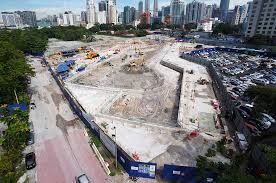
Abu Dhabi has still failed to inject any cash.
Yet it is notable that these two executives were also in control of Aabar’s newly acquired Swiss private banking institution Falcon Bank, whose Singapore branch has now been identified as the institution which passed nearly US$700 million into Najib’s private account at AmPrivate Banking a few days later.
Look at the dates!
The actual bond had in fact been raised several days before the above April 15th announcement.
1MDB’s Annual Reports for 2013 and 2014 show that the US$3 billion bond was raised for 1MDB Global Investments by 19th March 2013, being specified as “seed capital” for the ‘joint venture’ firm ADMIC (Abu Dhabi Malaysia Investment Corporation) to develop Tun Razak Exchange.
What lightening speed – just one week after the ‘Strategic Agreement’ was signed!
We are told only that this money arrived at “a licensed financial institution”. It did so just two days before the first transfer of US$619,999,988 was made to Najib Razak’s AmPrivate Banking account in KL on 21st March 2013, which itself was just ten days before the election was called.
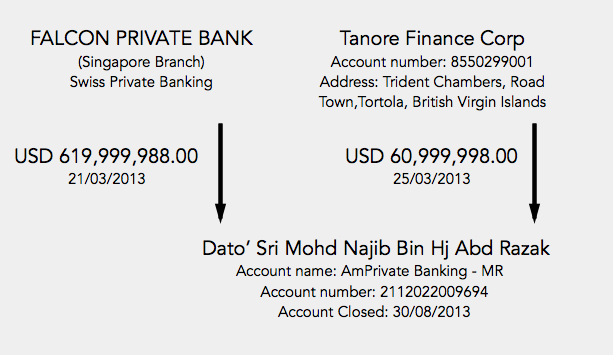
It is surely now a legitimate question to ask whether this “licensed financial institution” was in fact none other than Falcon Bank, which belongs to the partners in this ADMIC deal, i.e. the Aabar fund?
The Chairman of the Board of Falcon at that time was Mohammed Al-Husseiny, the CEO of Aabar, who had attended the signing ceremony in KL the previous week.
Why the hurry? – “client wanted the money quickly”
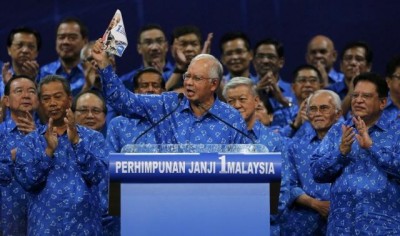
Research of the limited facts made available by 1MDB’s opaque auditing point ever more strongly to the relevance of the impending election to raising of vast funds by ADMIC (not to be confused with the Jho Low owned company ADKMIC, which received over US$530 million from Good Star, according to the Singapore authorities).
One of the most controversial aspects of the deal was the huge commission paid to the bank Goldman Sachs International, which underwrote the entire bond issue.
Goldman’s fee was US$300 million for this transaction alone (the bank claimed similar enormous fees from the other two bonds it helped raise for 1MDB in order to fund the purchase of power plants).
When asked by business journals as to why it had seen fit to charge such an enormous fee for its services in the raising of this bond, Goldman replied that:
“the client wanted the money quickly” [Bloomberg]
Indeed cannot the assumption be made that Goldman were able to justify this inflated commission, because the bank in fact had forwarded the money and taken on the burden of the subsequent bond sale at its own risk?
Given that just two days after US$2.7 billion was paid into ADMIC (19th March 2013) the first of two enormous transactions for nearly US$700 million was paid from Falcon Bank into the Prime Minister’s account, it is surely fair to ask if the two sums were related?
If not, from where did this money come?
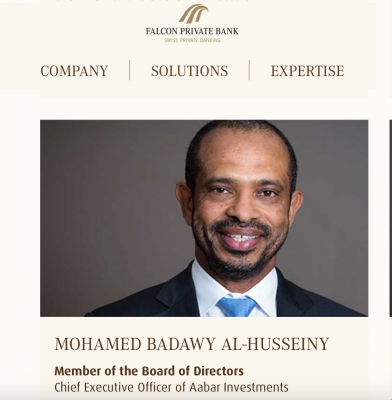
Najib Razak called the election just two weeks later (after another US$60,999,988 had been received into his account on 25th March).
The Prime Minister has denied that this money received by him from Aabar’s Falcon Bank was for “personal gain”, but he has not denied it was paid.
Was it therefore for “political gain” and to secretly finance the personal gains of others, who benefited from the enormous handouts that characterised the GE 13 election campaign?
Investigators plainly believe that this was public money derived from 1MDB, so these questions are rightfully put and ought to be answered.
Where is the money now?
Finally, if the money was not used in the election and not used by the Prime Minister himself,where did it go, since the AmPrivate Banking account where the money had been sent was closed at the end of August after the election had taken place?
Meanwhile, it has been widely remarked that very little development seems to have successfully taken place at the Tun Razak Exchange site from the US$3 billion raised over two years ago.
While not much appears to remain of the money that was raised.
The Accounts
According to the 1MDB Annual Report of 2013, ADMIC received US$2.7 billion on 19th March 2013 of which US$1.58 billion was “placed in various investment portfolios under the custody of a licensed financial institution”.
The US$1.42 balance, says the same report, was placed in “time deposits and cash accounts with the same financial institution for the purposes of cash management”.
By the Annual Report of 2014 it seems that rather a lot of this had gone, but not on the development of the Tun Razak Exchange:
USD$1.56 remained in the investment portfolios ($200 million less than before).
However, the “remaining net proceeds” had been “utilised by the working capital and debt repayment purposes” of the company.
This leaves glaring questions over why so much money raised for development should have been used to repay debts.
Also, if the company is desperate for cash to service the rest of its debts, why it has not dipped into the US$1.56 billion, which is supposed to remain in those investment portfolios?
Finally, are we now to assume that a chunk of this money was sent to the Prime Minister Najib Razak’s personal accounts to cover the GE 13 election expenses?

